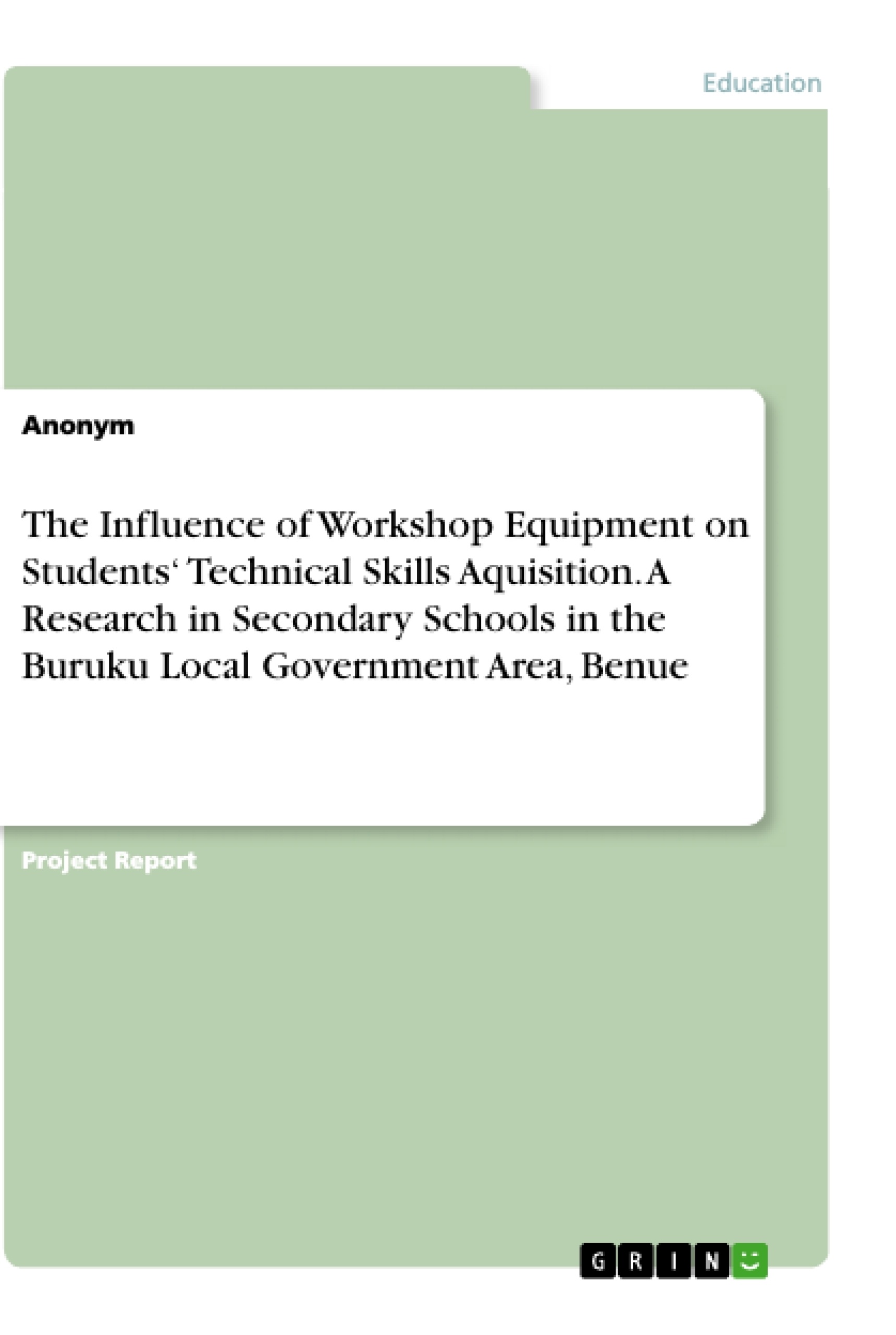The cardinal purpose of the study is to determine the influence of workshop equipment on students’ technical skills acquisition in Buruku Local Government Area. In order to generate adequate information needed to actualize the purpose of this research the following research questions were posed: What is the availability equipment/materials for learning VTE subject? What are the attitude of the policy makers/proprietors towards the learning of vocational subjects? What are the parent’s attitudes towards the learning of VTE? What are the student’s attitudes towards the learning of VTE subjects?
The research work covered the whole of secondary schools in Buruku local government area of Benue state. This study is delimited to finding the causes and influence of workshop equipment on students’ technical skills acquisition in secondary schools with in Buruku Local Government area as an area of coverage. The researchers deliberately chose Buruku Local Government Area because they feel no research of this nature has been carried out on the topic in this area. The topic will only cover skills acquisition of students.
Inhaltsverzeichnis (Table of Contents)
- INTRODUCTION
- REVIEW OF RELATED LITERATURE
- RESEARCH METHOD
- DATA PRESENTATION, ANALYSIS, INTERPRETATION AND DISCUSSION OF FINDINGS
- SUMMARY CONCLUSIONS AND RECOMMENDATIONS
Zielsetzung und Themenschwerpunkte (Objectives and Key Themes)
This study examines the current state of Vocational and Technical Education (VTE) in Nigeria, exploring its historical development, challenges, and potential for improvement. The research aims to understand the factors influencing the quality and effectiveness of VTE in the country, with a focus on secondary schools.
- The historical evolution of VTE in Nigeria, from traditional practices to contemporary educational systems.
- The impact of colonial influences and the role of educational policies on VTE development.
- The challenges faced by VTE in Nigeria, including inadequate funding, lack of qualified teachers, and the dominance of cognitive-based education.
- The potential of VTE to contribute to national development and economic growth.
- The importance of integrating practical skills and technology in education.
Zusammenfassung der Kapitel (Chapter Summaries)
- Chapter One: Introduction - This chapter provides a comprehensive overview of Vocational and Technical Education (VTE), its historical context in Nigeria, and the significance of its role in national development. The chapter examines the evolution of VTE from traditional practices to contemporary educational systems, highlighting the challenges faced by VTE in Nigeria, including inadequate funding, lack of qualified teachers, and the dominance of cognitive-based education. It emphasizes the importance of integrating practical skills and technology in education to prepare students for the demands of the modern workforce.
- Chapter Two: Review of Related Literature - This chapter presents a critical review of existing literature relevant to VTE in Nigeria. It examines various research findings, theories, and perspectives on the subject, providing a foundational understanding of key concepts and issues related to VTE. The chapter explores the impact of colonial influences, educational policies, and socio-economic factors on the development of VTE in the country. It also analyzes various models and approaches to VTE implementation, highlighting successful practices and areas for improvement.
- Chapter Three: Research Method - This chapter outlines the research methodology employed in the study. It describes the research design, data collection techniques, and data analysis methods used to gather and interpret information related to VTE in Nigerian secondary schools. The chapter clarifies the rationale for the chosen research approach, explaining its appropriateness and limitations. It also discusses the ethical considerations and data management procedures followed during the study.
- Chapter Four: Data Presentation, Analysis, Interpretation and Discussion of Findings - This chapter presents and analyzes the data gathered during the research, discussing the findings and their implications for VTE in Nigeria. The chapter employs appropriate statistical methods and qualitative analysis techniques to interpret the collected data, revealing patterns, trends, and insights into the challenges and opportunities facing VTE in secondary schools. It examines the factors influencing the effectiveness of VTE, including teacher training, curriculum design, and access to resources. The chapter also explores the perceptions and experiences of students, teachers, and stakeholders involved in VTE.
Schlüsselwörter (Keywords)
Vocational and Technical Education (VTE), Nigeria, secondary education, skills development, curriculum, teacher training, technology integration, economic development, national policy, educational challenges.
- Citation du texte
- Anonym (Auteur), 2019, The Influence of Workshop Equipment on Students‘ Technical Skills Aquisition. A Research in Secondary Schools in the Buruku Local Government Area, Benue, Munich, GRIN Verlag, https://www.grin.com/document/1129512



